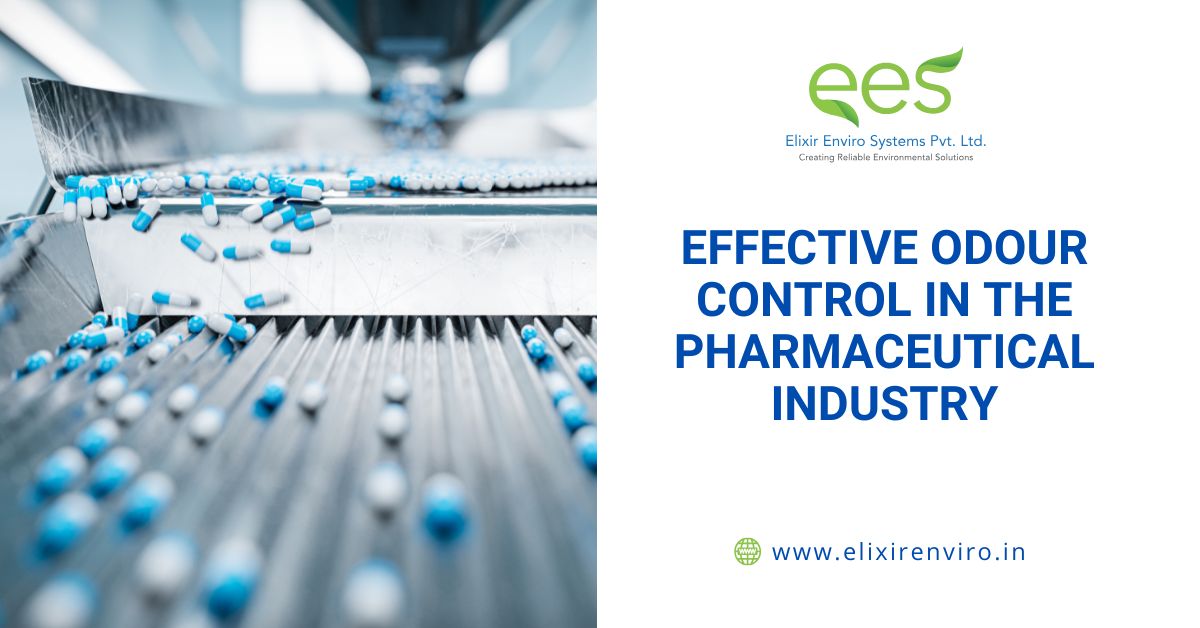
The pharmaceutical industry plays a critical role in advancing healthcare and improving lives. However, the production processes often result in the generation of unpleasant and potentially harmful odours. These odours can arise from the use of volatile organic compounds (VOCs), chemical reactions, or microbial activity, and they pose significant challenges for both the environment and workplace safety. Implementing effective odour control measures is essential for pharmaceutical companies to meet regulatory requirements, maintain community relations, and ensure the well-being of their workforce.
Pharmaceutical facilities produce odours from various processes and activities, such as:
Raw Material Storage: Improper storage of raw materials, particularly those prone to degradation, can contribute to odour issues.
Chemical Synthesis and Solvent Evaporation: Volatile Organic Compounds (VOCs) are often released during chemical synthesis and solvent evaporation. They contribute to strong odours and may pose health risks if inhaled.
Fermentation Processes: The cultivation of microorganisms for drug production can generate gases like hydrogen sulfide, ammonia, and other odorous compounds.
Waste Handling: The storage and treatment of solid and liquid waste can lead to the emission of unpleasant odours, especially if organic matter decomposes anaerobically and also due to release solvents or VOCs from wastewater for example.
The pharmaceutical industry faces several hurdles in managing odour effectively.
Process Variability: Pharmaceutical processes frequently change with new drug formulations, leading to inconsistent odour profiles.
Complex Odour Mixtures: A mix of organic and inorganic compounds can make odour neutralization challenging.
Regulatory Compliance: Governments worldwide impose stringent air quality standards, necessitating robust odour control measures.
Community Pressure: Facilities in populated areas must address odour concerns to maintain positive relationships with surrounding communities.
Pressure from Exporters/importing countries: Many a times the the drug importing countries fix several standards both on the product and the environment, work atmosphere and sustainability. Adhering to those standards often leads to better prices of the product as many companies incentivise the efforts made in these aspects.
Regulatory Compliance: Adhering to environmental standards reduces the risk of penalties and operational delays.
Improved Community Relations: Minimizing odour emissions fosters goodwill among local communities.
Enhanced Workplace Safety: Reducing exposure to harmful odorous compounds protects employees’ health.
Sustainability Goals: Adopting eco-friendly odour control methods aligns with corporate environmental strategies.
Elixir Enviro Systems is the pioneer in the Industrial Odour Control in India. We have served different types of industries such as fishmeal industry, fish and shrimp feed industries, gelatin manufacturing industry, bone meal industry, rendering plants, wastewater treatment plants, solid waste management facilities etc. At Elixir Enviro Systems, we adhere to the culture of innovation. Few of our products and services and the innovation culture can be visible in this short video: Click here to watch the video
We specialize in providing cutting-edge odour control solutions tailored to the industry. Our offerings include biofilters (high rate Biofilters, modular Biofilters, standard rate Biofilters), advanced scrubbing systems (bioscrubbers, acid scrubbers, alkali scrubbers), thermal oxidisers, activated carbon filters and real-time monitoring tools designed to tackle complex odour challenges. By focusing on sustainability and operational efficiency, we help our clients achieve environmental compliance and business success. Some of the key odour control technologies include:
Effective odour control is essential for the pharmaceutical industry to balance its critical role in healthcare with environmental responsibility. By adopting advanced technologies and strategic approaches, companies can manage odour emissions, enhance community trust, and contribute to a cleaner, healthier environment. At Elixir Enviro Systems, we are committed to providing innovative and customized odour control solutions that meet the unique needs of the pharmaceutical sector, fostering a cleaner and healthier future for all.




